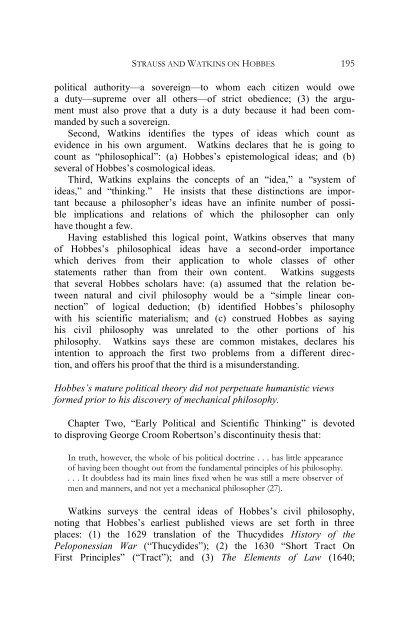Strauss and Watkins on Hobbes' Political Philosophy: A Review
Strauss and Watkins on Hobbes' Political Philosophy: A Review
Strauss and Watkins on Hobbes' Political Philosophy: A Review
You also want an ePaper? Increase the reach of your titles
YUMPU automatically turns print PDFs into web optimized ePapers that Google loves.
STRAUSS AND WATKINS ON HOBBES 195<br />
political authority—a sovereign—to whom each citizen would owe<br />
a duty—supreme over all others—of strict obedience; (3) the argu-<br />
ment must also prove that a duty is a duty because it had been com-<br />
m<str<strong>on</strong>g>and</str<strong>on</strong>g>ed by such a sovereign.<br />
Sec<strong>on</strong>d, <str<strong>on</strong>g>Watkins</str<strong>on</strong>g> identifies the types of ideas which count as<br />
evidence in his own argument. <str<strong>on</strong>g>Watkins</str<strong>on</strong>g> declares that he is going to<br />
count as “philosophical”: (a) Hobbes’s epistemological ideas; <str<strong>on</strong>g>and</str<strong>on</strong>g> (b)<br />
several of Hobbes’s cosmological ideas.<br />
Third, <str<strong>on</strong>g>Watkins</str<strong>on</strong>g> explains the c<strong>on</strong>cepts of an “idea,” a “system of<br />
ideas,” <str<strong>on</strong>g>and</str<strong>on</strong>g> “thinking.” He insists that these distincti<strong>on</strong>s are impor-<br />
tant because a philosopher’s ideas have an infinite number of possi-<br />
ble implicati<strong>on</strong>s <str<strong>on</strong>g>and</str<strong>on</strong>g> relati<strong>on</strong>s of which the philosopher can <strong>on</strong>ly<br />
have thought a few.<br />
Having established this logical point, <str<strong>on</strong>g>Watkins</str<strong>on</strong>g> observes that many<br />
of Hobbes’s philosophical ideas have a sec<strong>on</strong>d-order importance<br />
which derives from their applicati<strong>on</strong> to whole classes of other<br />
statements rather than from their own c<strong>on</strong>tent. <str<strong>on</strong>g>Watkins</str<strong>on</strong>g> suggests<br />
that several Hobbes scholars have: (a) assumed that the relati<strong>on</strong> be-<br />
tween natural <str<strong>on</strong>g>and</str<strong>on</strong>g> civil philosophy would be a “simple linear c<strong>on</strong>-<br />
necti<strong>on</strong>” of logical deducti<strong>on</strong>; (b) identified Hobbes’s philosophy<br />
with his scientific materialism; <str<strong>on</strong>g>and</str<strong>on</strong>g> (c) c<strong>on</strong>strued Hobbes as saying<br />
his civil philosophy was unrelated to the other porti<strong>on</strong>s of his<br />
philosophy. <str<strong>on</strong>g>Watkins</str<strong>on</strong>g> says these are comm<strong>on</strong> mistakes, declares his<br />
intenti<strong>on</strong> to approach the first two problems from a different direc-<br />
ti<strong>on</strong>, <str<strong>on</strong>g>and</str<strong>on</strong>g> offers his proof that the third is a misunderst<str<strong>on</strong>g>and</str<strong>on</strong>g>ing.<br />
Hobbes’s mature political theory did not perpetuate humanistic views<br />
formed prior to his discovery of mechanical philosophy.<br />
Chapter Two, “Early <strong>Political</strong> <str<strong>on</strong>g>and</str<strong>on</strong>g> Scientific Thinking” is devoted<br />
to disproving George Croom Roberts<strong>on</strong>’s disc<strong>on</strong>tinuity thesis that:<br />
In truth, however, the whole of his political doctrine . . . has little appearance<br />
of having been thought out from the fundamental principles of his philosophy.<br />
. . . It doubtless had its main lines fixed when he was still a mere observer of<br />
men <str<strong>on</strong>g>and</str<strong>on</strong>g> manners, <str<strong>on</strong>g>and</str<strong>on</strong>g> not yet a mechanical philosopher (27).<br />
<str<strong>on</strong>g>Watkins</str<strong>on</strong>g> surveys the central ideas of Hobbes’s civil philosophy,<br />
noting that Hobbes’s earliest published views are set forth in three<br />
places: (1) the 1629 translati<strong>on</strong> of the Thucydides History of the<br />
Pelop<strong>on</strong>essian War (“Thucydides”); (2) the 1630 “Short Tract On<br />
First Principles” (“Tract”); <str<strong>on</strong>g>and</str<strong>on</strong>g> (3) The Elements of Law (1640;
















